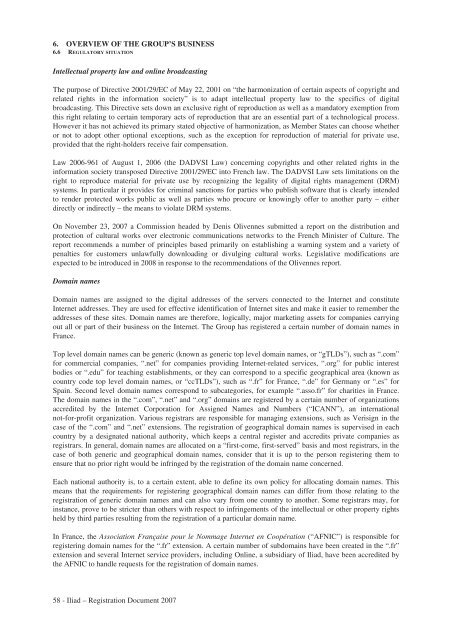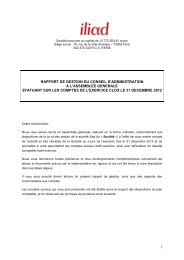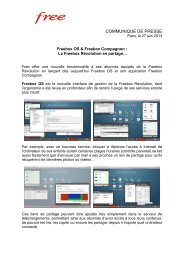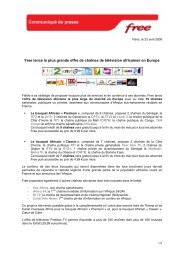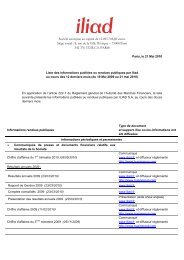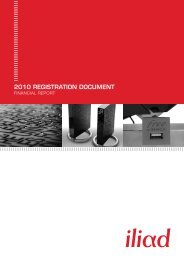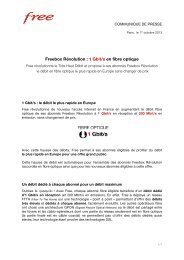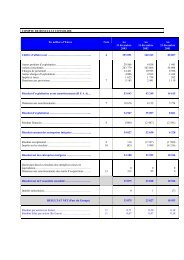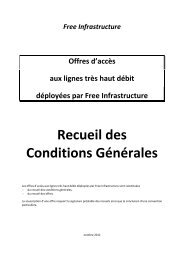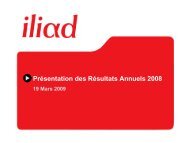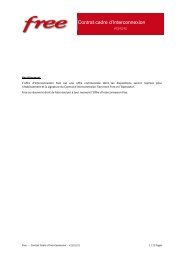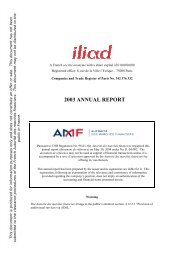REGISTRATION DOCUMENT AND FINANCIAL REPORT - Iliad
REGISTRATION DOCUMENT AND FINANCIAL REPORT - Iliad
REGISTRATION DOCUMENT AND FINANCIAL REPORT - Iliad
- TAGS
- registration
- iliad
- iliad.fr
Create successful ePaper yourself
Turn your PDF publications into a flip-book with our unique Google optimized e-Paper software.
6. OVERVIEW OF THE GROUP’S BUSINESS<br />
6.6 REGULATORY SITUATION<br />
Intellectual property law and online broadcasting<br />
The purpose of Directive 2001/29/EC of May 22, 2001 on “the harmonization of certain aspects of copyright and<br />
related rights in the information society” is to adapt intellectual property law to the specifics of digital<br />
broadcasting. This Directive sets down an exclusive right of reproduction as well as a mandatory exemption from<br />
this right relating to certain temporary acts of reproduction that are an essential part of a technological process.<br />
However it has not achieved its primary stated objective of harmonization, as Member States can choose whether<br />
or not to adopt other optional exceptions, such as the exception for reproduction of material for private use,<br />
provided that the right-holders receive fair compensation.<br />
Law 2006-961 of August 1, 2006 (the DADVSI Law) concerning copyrights and other related rights in the<br />
information society transposed Directive 2001/29/EC into French law. The DADVSI Law sets limitations on the<br />
right to reproduce material for private use by recognizing the legality of digital rights management (DRM)<br />
systems. In particular it provides for criminal sanctions for parties who publish software that is clearly intended<br />
to render protected works public as well as parties who procure or knowingly offer to another party – either<br />
directly or indirectly – the means to violate DRM systems.<br />
On November 23, 2007 a Commission headed by Denis Olivennes submitted a report on the distribution and<br />
protection of cultural works over electronic communications networks to the French Minister of Culture. The<br />
report recommends a number of principles based primarily on establishing a warning system and a variety of<br />
penalties for customers unlawfully downloading or divulging cultural works. Legislative modifications are<br />
expected to be introduced in 2008 in response to the recommendations of the Olivennes report.<br />
Domain names<br />
Domain names are assigned to the digital addresses of the servers connected to the Internet and constitute<br />
Internet addresses. They are used for effective identification of Internet sites and make it easier to remember the<br />
addresses of these sites. Domain names are therefore, logically, major marketing assets for companies carrying<br />
out all or part of their business on the Internet. The Group has registered a certain number of domain names in<br />
France.<br />
Top level domain names can be generic (known as generic top level domain names, or “gTLDs”), such as “.com”<br />
for commercial companies, “.net” for companies providing Internet-related services, “.org” for public interest<br />
bodies or “.edu” for teaching establishments, or they can correspond to a specific geographical area (known as<br />
country code top level domain names, or “ccTLDs”), such as “.fr” for France, “.de” for Germany or “.es” for<br />
Spain. Second level domain names correspond to subcategories, for example “.asso.fr” for charities in France.<br />
The domain names in the “.com”, “.net” and “.org” domains are registered by a certain number of organizations<br />
accredited by the Internet Corporation for Assigned Names and Numbers (“ICANN”), an international<br />
not-for-profit organization. Various registrars are responsible for managing extensions, such as Verisign in the<br />
case of the “.com” and “.net” extensions. The registration of geographical domain names is supervised in each<br />
country by a designated national authority, which keeps a central register and accredits private companies as<br />
registrars. In general, domain names are allocated on a “first-come, first-served” basis and most registrars, in the<br />
case of both generic and geographical domain names, consider that it is up to the person registering them to<br />
ensure that no prior right would be infringed by the registration of the domain name concerned.<br />
Each national authority is, to a certain extent, able to define its own policy for allocating domain names. This<br />
means that the requirements for registering geographical domain names can differ from those relating to the<br />
registration of generic domain names and can also vary from one country to another. Some registrars may, for<br />
instance, prove to be stricter than others with respect to infringements of the intellectual or other property rights<br />
held by third parties resulting from the registration of a particular domain name.<br />
In France, the Association Française pour le Nommage Internet en Coopération (“AFNIC”) is responsible for<br />
registering domain names for the “.fr” extension. A certain number of subdomains have been created in the “.fr”<br />
extension and several Internet service providers, including Online, a subsidiary of <strong>Iliad</strong>, have been accredited by<br />
the AFNIC to handle requests for the registration of domain names.<br />
58 - <strong>Iliad</strong> – Registration Document 2007


